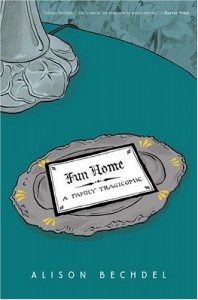In the comments to Suat’s post on Fun Home, Uland notes;
The milkman bit is interesting, but I think it bears pointing out that a literary allusion isn’t an allusion at all if it’s being pointed out in the text. It’s a reference.
It isn’t that I have a problem with the drawing or the subject matter. It’s more that it all seems so prescribed . The author refuses to allow mystery to intrude upon her strategy. The literary references seem like a huge part of that strategy. Employed in a less on-the-nose kind of way, I think it could’ve been really effective.
I get the sense that Bechdel pulled back and , reminding herself that it’s just a graphic novel, tried to pull all these different schemes into nice little packages. Problem is, it’s a story about confusion, mystery, shame, secrets, etc. Rather than letting them loose, she seemed to want to conquer them..
Agreeing with Uland is always disturbing…but I agree with Uland.
I think the comparison with Likewise is pretty interesting here. Both Bechdel and Schrag have an ambivalent attitude towards literariness and art. Bechdel associates it with her father; Schrag associates it with Joyce (and through Joyce with Ariel’s girlfriend, Sally.)
Schrag uses that ambivalence structurally; her desire to embrace Joyce and distance herself from him is incorporated into the storytelling, both through her use of or dropping of stream of consciousness, and through the artwork, which is in some ways obsessively ordered and in some ways deliberately random. Chaos and confusion are important thematically, so Schrag makes them part of her storytelling
Bechdel doesn’t do that. She criticizes her father for his artificiality and for wanting a neat bourgeois existence — but her own work never gets beyond insistent artificiality and the conventions of a decidedly bourgeois genre. Everything is neat and in its place; if she’s referencing Icarus, she tells you she’s referencing Icarus; if the house is a metaphor for her dad’s obsessions, she tells you the house is a metaphor for her dad’s obsessions. And if she wants to show a parallel between herself and her father, she does it in the most obvious ways possible — look, it’s a split screen! And also…mirrors!
I find Bechdel’s writing itself almost intolerably clumsy…but I think the narrative and thematic flaws of the book are in many ways more crippling. This is a story about the dangers of deliberately acclimatizing yourself to a typical middle-class existence. But the book…deliberately acclimatizes itself to a typical middle-class narrative. Bechdel fits her book about queer fathers and queer daughters neatly into a classic father/son memoir dynamic. As I said in another context:
The American memoir is a fairly simple formula. Clearly identify your colorful ethnic heritage (Chinese, Jewish, Irish…even Appalachian will do.) Milk said heritage for all it is worth. Discuss your simultaneous love of and resentment of said heritage. Milk your ambivalence for all it is worth. Feel deeply. Stir well, then appear on Terri Gross.
Suat notes that “Much of [Fun Home’s] appeal to general audiences must lie in the way it gently eases readers into the comics medium.” Fun Home did appeal to a lot of people. The irony is, of course, that it’s ingratiating in much the same way that Bechdel’s dad is ingratiating. It uses bourgeois and literary trappings to present a familiar and comforting front. Thus, readers can safely condemn Bechdel’s father for his capitulation to convention while reading a book that goes down so easily by virtue of obsessively cleaning up all its messes. Bechdel takes her quirky, colorful past, dabbles it with knowing commentary, and serves the results to a literary audience eager to smack its lips over delectable, safely contained difference. A rich, unusual, ideally painful childhood is the spice that both validates one’s present normality and makes it worth consuming. Sacrificing your ancestors is, as James Baldwin acidly put it, the price of the ticket.

